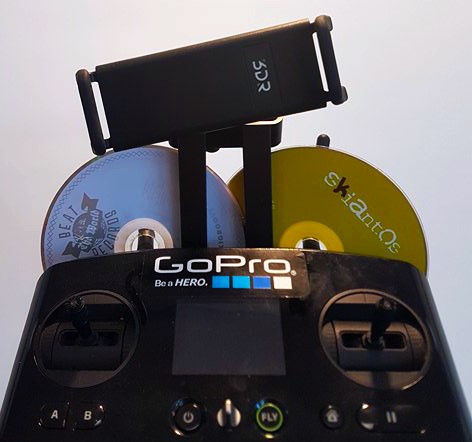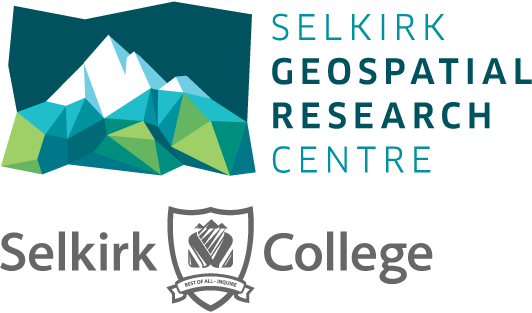
Drone Surveying: The Devil in the Details
By Evan Amies-Galonski on 2017-07-21 15:00
After completing the ADGIS program at Selkirk College in April 2017, I was fortunate enough to score one of the 5 Co-op positions at the SGRC. Joey Plessis and I were selected to work as a team on the RDCK Parks UAV Project.
After some thorough training by SGRC Research Assistant Ian Dennis, we were sent out to perform drone based aerial surveys for a long list of Regional District of Central Kootenay (RDCK) parks and recreation sites. We got all set up in the GIS computer lab, in preparation to undertake all the necessary data processing involved in producing ortho-rectified imagery, and compilations of promotional media. All the way from survey planning, to the refinement of final products, this project has required one thing above all others: constant and vigilant attention to detail. From precarious emergency landings, through inexplicable technological errors, to conversations with ranting drone-conspiracy theorists, this has been an interesting summer to say the least. I have been incredibly grateful for all the support we received from the SGRC staff in the times of ultimate confusion, and I’ve learned a few valuable lessons along the way, so I thought I’d share them here.
Lesson 1: Seriously, pay attention to the details.
Easy-breezy summer dream job? Almost, just take out the easy-breezy part. Usually when I tell someone what I’m doing for work, they give me a slightly envious look and say something along the lines of, “wow that sounds like the chilliest summer job ever”. On occasion, this proves true, But I’ve learned that the line between a fun in the sun afternoon of remote controlled recreation, and a nerve fraying crisis is ever so thin. As thin as a controller antenna, or a GPS satellite connection. The knowledge that you have temporarily lost control of several thousands of dollars of dangerous flying hardware can cause one to turn inwards on oneself. I could count on one hand the number of survey days that didn’t involve either a technological break down, or at least one moment of terror. Actually I could count it on one finger. There is a long chain of tiny details that must accommodated for in every step of the process, and if the chain breaks, things get quite complicated, and suddenly there are a whole lot more details that must be accommodated. It was definitely a blessing that this was a two-man project, as it gave us a second line of defense to help us prevent these little things from falling through the cracks. All that being said, When it’s good, it’s really good. All of a sudden I’ll find myself on a sunny afternoon calmly flying a small obedient aircraft at some beautiful place like Taghum beach, or Glacier Creek campground, and I’ll say to myself “Is this a dream? Is this work?”. It has been amazing to get a chance to travel around to all of these incredibly beautiful gems in the area, and work with all the great people at the SGRC and RDCK.
Lesson 2: Never assume you are prepared, but be prepared to be creative.
Although we were given ample practice time to hone our drone skills before being dispatched onto a real project, there are some things that cannot be taught in advance. You can spend as much time as you like, carefully planning flights, checking off all 50 items on the survey packing list, charging all of the 12 battery powered devices, and waltz out of the office with an accurate and informative site map, and something will still find a way to go sideways on you. You’d think that after a few months of performing these surveys, we would have run into pretty much every stumbling block at least once, and could plan for it. Not so. With so many pieces of electronic equipment, several of which must continuously communicate with each other, the number of problems that can occur appears to be endless. One of the most valuable skills I developed with this job is the capacity to trouble shoot, and with no one around to help, creativity and persistence are virtues. Who knew Joey’s Italian punk rock CDs could drastically improve our controller range and allow us to complete a survey that we otherwise couldn’t have done?

Lesson 3: Learn by fire = Learn fast.
In a summer student position, mentorship is key, and the SGRC is stacked with mentorship. It has been such a privilege to be constantly surrounded by GIS experts, who are always willing to offer advice and assistance. This was a huge help when dealing with processing issues in the lab, but out in the field, suddenly your only resource is yourself (and mobile phone Google searches if your lucky). Trial and error is the name of the game, and its amazing what can be accomplished if you just keep hacking at a problem. Ideally you solve it, but regardless, you learn a whole plethora of other things about the systems you are working with, and that ends up being invaluable knowledge down the road. Each time one of these problems occurs, its like a crash course of learning. I usually find most of my motivation for learning based on what my interests are, like the way I was initially interested in the GIS program at Selkirk. But when things start to get complicated or difficult, it can be all too easy to put aside something your just interested in, and therefore limit your learning. I now greatly value the deeper and more intricate knowledge I have gained from such “We absolutely need to fix this” situations, standing in some gravel pit at the end of a long day. The fact is when you feel “need” to do something, instead of just “want” or “should”, you can really surprise yourself with what you can learn, and what you can do.
I’m the kind of person that likes to get straight to the point, and be immersed in what I am doing/learning, and I always found it cumbersome that in almost all post-secondary programs, students are required to take electives that are peripheral to the focus. This is a primary reason why I applied to the GIS program, pretty much everything was relevant to my interests. The Applied Research part takes this a step further. Learning interesting things in a hypothetical school setting provides motivation, but only to a point. It’s what you “want” to do, or what you “should” do. What I’ve got serious gratitude for is the fact that this Co-op put me in “need” situations. Obviously not life or death, but the fact that my actions had a significant impact on real people in the real world, gives me not only motivation, but inspiration. For me this completes the cycle of learning, to realize the value of what I am doing, and it sets a new and more tangible context to the knowledge I’ve gained.
May your thumbs be steady, and your GPS never falter.
